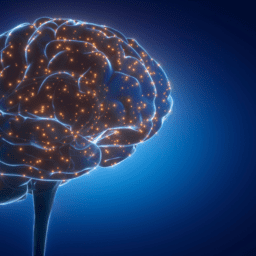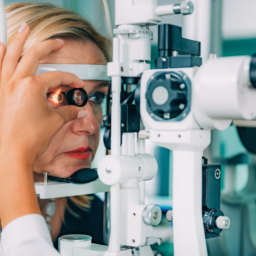The human body was built to work in partnership with the sun. Its light can transform our moods, focus, sleep, energy levels, immune systems, bone density, and mental health. As a result, spending time in the sun can be particularly beneficial to people living with Parkinson’s who experience symptoms like depression, apathy, poor sleep, pain, and fatigue. And all you need to do to reap these benefits is step into the light. Here, we’ll look at the many ways sunlight can help you live well with Parkinson’s.
#1 — Sunlight makes you happy
Exposure to sunlight triggers the production of serotonin. Like dopamine, the chemical messenger that is impacted by Parkinson’s, serotonin is a neurotransmitter that helps brain cells and other nervous system cells communicate. Serotonin helps regulate mood and helps you feel emotionally stable. In other words, like dopamine, serotonin helps you feel good. And when you feel good, you are more likely to take actions that help you live well with Parkinson’s, such as exercising, connecting with others, and staying involved in your community.
Serotonin is also a powerful ally for the 50-60% of people living with Parkinson’s who experience depression or anxiety. (Selective Serotonin Reuptake Inhibitors (SSRIs), the most commonly prescribed antidepressants for Parkinson’s-related depression, work by increasing levels of serotonin in the brain.)
One of the easiest ways to boost your serotonin levels every day? Chase the sun.
When the sun’s ultraviolet light is absorbed through your skin, your body produces vitamin D, and vitamin D, in turn, promotes the production of serotonin. Serotonin, in turn, produces feelings of happiness and well-being. “Given that the relationship between sunshine and serotonin is probably a multimedia phenomenon, one contributory facet may be the role of sunshine on human skin,” reported Dr. Randy A. Sansone, MD, and Lori A. Sansone, MD, in a 2013 study. “Human skin has an inherent serotonergic system that appears capable of generating serotonin.” The team suggests that sunshine may stimulate serotonin production through the skin, which may explain the appeal of sunbathing, traveling during the summer months, and playing in the sun.
 The serotonergic system explains in part why many people experience “winter blues” or the more severe seasonal affective disorder (SAD) in the cold, winter months when daylight hours are fewer and people spend less time outdoors in the sun’s natural light. Less sunlight, less mood-brightening serotonin.
The serotonergic system explains in part why many people experience “winter blues” or the more severe seasonal affective disorder (SAD) in the cold, winter months when daylight hours are fewer and people spend less time outdoors in the sun’s natural light. Less sunlight, less mood-brightening serotonin.
#2 — Sunlight can improve your sleep
Poor quality sleep is one of the most common non-motor symptoms of Parkinson’s. If you experience sleep problems, one tool to add to your sleep hygiene toolbox is sunshine exposure.
Sunlight helps sleep in part because of its role in serotonin production, which is triggered not only when your skin absorbs sunlight but also when sunlight hits your eyes. The sunlight sends cues to specific areas of the retina that trigger the release of serotonin. Serotonin plays an important role in mood, focus, and sleep; it is the precursor for melatonin, the hormone that makes you feel sleepy when darkness falls.
Sunlight that is absorbed through your eyes also keeps your circadian rhythms on track. “The human eye contains photosensitive cells in its retina, with connections directly to the pituitary gland in the brain,” says Dr. Phil Maffetone, PhD, an applied kinesiologist with a background in biochemistry and exercise physiology. “Stimulation of these important cells comes from sunlight.”
Photosensitive cells in the eye directly impact the hypothalamus region of the brain, Dr. Maffetone says, and that region controls our biological clocks. “This influences our circadian rhythm…important for…normal sleep patterns, hormone regulation, increased reaction time, and behavior. Most cells in the body have an important cyclic pattern when working optimally, so just about any area of the body can falter without adequate sun stimulation.”
Time in the sun, therefore, helps regulate your sleep-wake cycle and can lead to better sleep. It’s the timing of sunlight and artificial light that is important to remember.
 Like serotonin, melatonin is linked to light. When your body experiences less light, like after sunset, your brain produces more melatonin, and you feel less awake. The less melatonin your brain produces, the higher your risk of insomnia and other sleep problems. This risk of insomnia is the reason sleep experts recommend avoiding bright lights at night; they interfere with the conversion of serotonin into melatonin, and melatonin is essential for a good night’s sleep.
Like serotonin, melatonin is linked to light. When your body experiences less light, like after sunset, your brain produces more melatonin, and you feel less awake. The less melatonin your brain produces, the higher your risk of insomnia and other sleep problems. This risk of insomnia is the reason sleep experts recommend avoiding bright lights at night; they interfere with the conversion of serotonin into melatonin, and melatonin is essential for a good night’s sleep.
“A lot of people are jet-lagged at home,” says Dr. Andrew Huberman, neuroscientist and professor at Stanford University School of Medicine. “They’re looking at screens at night, and they’re not getting enough light in their eyes during the day… and there are severe mood disruptions. That pattern of behavior actually triggers a pro-depressive circuit.”
Dr. Huberman says if light enters your eye at the right time of day, you get an elevation in mood. If the light comes in at the wrong time (at night), your pro-depressive circuit will be activated.
To use sunlight to boost your sleep quality, Huberman suggests exposing your eyes to natural light early in the day. Even just two to 10 minutes of sunlight can ensure photons get through, even if there is cloud cover.
Seeking out the sun in the evening is important as well. If you expose your eyes to the sun when it is setting, it will set the appropriate timing of secretion of the hormone cortisol, which will make you alert at the right times of day.
#3 — Sunlight can boost your immune system, help manage pain, and shorten hospital stays
In the mid-19th Century, Florence Nightingale recognized the benefits of fresh air and sunlight for people who were ill. “Second only to fresh air…I should be inclined to rank light in importance for the sick,” she wrote after her experiences as a nurse during the Crimean War. “Direct sunlight, not only daylight, is necessary for a speedy recovery.”
Why? When you expose your skin to UVB rays, your body produces beta-endorphins, “opioid peptides [that] have the result of increasing a feeling of well-being, boosting the immune system, relieving pain, promoting relaxation, healing wounds, and cellular differentiation.”
Because pain is a common Parkinson’s symptom (studies show that between 60 and 83% of people with Parkinson’s report experiencing pain, and chronic pain is twice as common in people living with Parkinson’s than it is in those without Parkinson’s) knowing that sunlight can help is important.
 In addition, beta-endorphins (hormones that reduce pain) can also help you feel more alert and reduce feelings of depression.
In addition, beta-endorphins (hormones that reduce pain) can also help you feel more alert and reduce feelings of depression.
More than a century later, researchers are using Florence Nightingale’s findings as a springboard to discover how light can impact the health of people who are hospitalized. In 2006, Dr. Anjali Joseph, PhD, shared results from a study on light and health outcomes, reporting that “by controlling the body’s circadian system, light impacts outcomes in healthcare settings by reducing depression among patients, decreasing length of stay in hospitals, improving sleep and circadian rhythm, lessening agitation among dementia patients, [and] easing pain.”
And a 2013 Loughborough University study of 263 coronary artery bypass graft surgery patients found that for every increase in daylight of 100 lux, a patient’s stay in an intensive care unit was reduced by more than seven hours.
#4 — Sunlight impacts dopamine levels
It’s impossible to talk about Parkinson’s without talking about dopamine, the neurotransmitter that helps regulate movement, emotional responses, and learning, and boosts mood, attention, and motivation. While the effects of sunlight on dopamine levels are not as widely reported as its effects on serotonin, studies have shown that exposure to sunlight can trigger the release of dopamine as well. A 2014 study from researchers at Ohio State University Center for Clinical and Translational Science stated that “when exposed to outdoor light, specialized cells in the retina help control how big or little the pupil dilates to let more or less light in. The cells connect to others that release dopamine — an important neurotransmitter in the eye and brain.”
Also, when your skin absorbs sunlight and produces vitamin D, that cycle triggers the production of dopamine as well as serotonin, meaning time in the sun can boost your dopamine levels. A 2018 study found that vitamin D may protect dopaminergic neurons against neuroinflammation and oxidative stress. “These findings should stimulate translational research towards the VD3 potential for prevention or treatment of neurodegenerative diseases, [such] as [Parkinson’s],” the researchers concluded.
#5 — Sunlight can strengthen your bones
Vitamin D is critical for your health not only because it triggers serotonin production but also because it helps your body absorb calcium. Calcium, known for its role in strengthening bones and preventing osteoporosis, is also crucial for our hearts, muscles, and nerves to function properly. Without enough vitamin D, your body cannot produce enough of the hormone calcitriol (also known as the “active vitamin D”), which, in turn, keeps your body from absorbing sufficient calcium.
 While you can get vitamin D through diet and supplements, your body can also produce it through exposure to sunlight. “We each have vitamin D receptor cells that, through a chain of reactions starting with conversion of cholesterol in the skin, produce vitamin D3 when they’re exposed to ultraviolet B (UVB) from the sun,” says Yale Medicine dermatologist Dr. David J. Leffell, MD.
While you can get vitamin D through diet and supplements, your body can also produce it through exposure to sunlight. “We each have vitamin D receptor cells that, through a chain of reactions starting with conversion of cholesterol in the skin, produce vitamin D3 when they’re exposed to ultraviolet B (UVB) from the sun,” says Yale Medicine dermatologist Dr. David J. Leffell, MD.
This doesn’t mean you should spend large amounts of time in the sun without sunscreen and other protective measures, of course. Because UVB light can cause skin cancer, it’s important to protect your skin. The ideal amount of time in the sun without sunscreen depends on where you live, the season, your skin color, and other factors, so be sure to talk to your doctor about your vitamin D levels and their recommendations for getting enough.
Act
As you can see, even in cold and dark winter months, it’s critical to get outside into the light. Even short periods outdoors can bring countless benefits. According to the World Health Organization, getting just 15 minutes a day of natural sunlight can reduce stress and anxiety and may help you sleep better at night.
 Looking to boost the benefits even more? While you’re soaking up the sun, get moving. Bring a friend. Pick up trash. Tend a garden. Volunteer. And watch how your life, so linked with the sun, is transformed.
Looking to boost the benefits even more? While you’re soaking up the sun, get moving. Bring a friend. Pick up trash. Tend a garden. Volunteer. And watch how your life, so linked with the sun, is transformed.
Additional Resources
Why Getting More Light Will Transform Your Health with Linda Geddes
Sunlight: Good For the Eyes as well as the Brain
What to know about the health benefits of sunlight
Regenerating optic pathways from the eye to the brain
Boosting Your Serotonin Activity

















